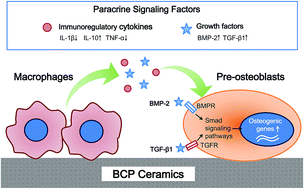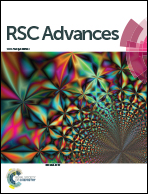The positive role of macrophage secretion stimulated by BCP ceramic in the ceramic-induced osteogenic differentiation of pre-osteoblasts via Smad-related signaling pathways†
Abstract
The emergence of osteoimmunology has demonstrated that immune responses play a vital role in bone regeneration. Macrophages, as the most abundant immune cells have received increasing attention, however, the influences of bone substitute materials on macrophage activities are not fully understood. In this study, osteoinductive biphasic calcium phosphate (BCP) ceramics were chosen as a material model, and cultured with macrophages in vitro to investigate the effects of the material properties on immune responses and their roles in osteogenesis. The results show that a macrophage/BCP conditioned medium could promote BCP-stimulated differentiation of pre-osteoblasts by up-regulating expression of osteogenic specific genes and increasing matrix mineralization. Compared to the coverslips, macrophages cultured in BCP ceramics showed an increase in cell size, but a decrease in cell proliferation. Moreover, further studies indicated that BCP ceramics could reduce secretion of TNF-α and IL-1β, but increase production of IL-10 and growth factors in macrophages, which might act synergistically in creating a pro-osteogenic micro-environment. The up-regulated BMP-2 and TGF-β1 in macrophages might promote osteogenic differentiation of pre-osteoblasts via a Smad-related signaling pathway in a paracrine model. These findings might provide an improved understanding of the role of material-modulated macrophage activities in material-stimulated osteogenesis, and also help to design bone substitute materials capable of inspiring desired immune responses and achieving good clinic performance.


 Please wait while we load your content...
Please wait while we load your content...